Others
INTERNATIONAL WOMEN'S DAY
Posted On: 07 MAR 2024 10:56AM
INTERNATIONAL WOMEN’S DAY
Nari Shakti: From Women Development to Women-led Development
(Ministry of Information & Broadcasting)
March 07, 2024
When women prosper, the world prospers.
- Prime Minister Narendra Modi
-
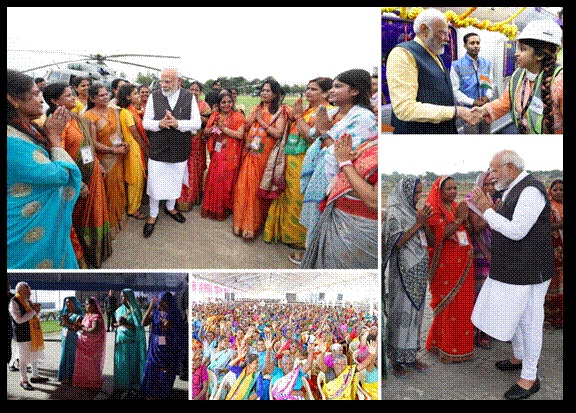 Women's empowerment remains a pivotal focus globally, resonating profoundly with the ethos of International Women's Day, celebrated on March 8th each year. This day serves as a reminder of the importance of gender equality and the need to uplift women across all facets of society. It's a time to acknowledge the contributions of women worldwide and to renew commitments towards achieving gender parity. In alignment with these ideals, the Government of India's dedication to promoting "Nari Shakti" and fostering women's leadership underscores the significance of this international observance. By recognizing the significant role women play in societal progress and actively working towards their empowerment, India reaffirms its commitment to advancing gender equality and inclusive development on the global stage.
Women's empowerment remains a pivotal focus globally, resonating profoundly with the ethos of International Women's Day, celebrated on March 8th each year. This day serves as a reminder of the importance of gender equality and the need to uplift women across all facets of society. It's a time to acknowledge the contributions of women worldwide and to renew commitments towards achieving gender parity. In alignment with these ideals, the Government of India's dedication to promoting "Nari Shakti" and fostering women's leadership underscores the significance of this international observance. By recognizing the significant role women play in societal progress and actively working towards their empowerment, India reaffirms its commitment to advancing gender equality and inclusive development on the global stage.
Women play an integral part in society; without their progress, the overall progress of society comes to a halt. Empowering women is not just a moral imperative but also a strategic necessity for societal development. Recognizing this, the Government of India has prioritized the promotion of "Nari Shakti" or women's empowerment within the nation. With a steadfast commitment to enhancing the lives of women and eliminating obstacles to their progress, the government aims to ensure that women are active participants in India's journey towards prosperity.
As said by Prime Minister Narendra Modi, “The one thing that will take the country forward is women-led development.” The Government of India considers women-led development a central dimension of India’s progress and a necessity for strengthening India.
In the last ten years, the Government of India has launched numerous welfare schemes that have aimed to empower women and make them lead India’s development journey.
Historic Milestone: Enactment of Women’s Reservation Bill
A milestone in this journey has been achieved by the passing of the Nari Shakti Vandan Adhiniyam which seeks to reserve one-third of the total number of seats for women in Lok Sabha, State Legislative Assemblies, and Delhi Assembly.
Another notable feature was that the Women’s Reservation Bill, called Nari Shakti Vandan Adhiniyam was the first to be considered in the new parliament building setting the tone for India’s Amrit Kaal.
In his remarks in the Rajya Sabha over this bill, the Prime Minister said that this will lead to a new confidence in the people of the country, and it also shows the positive thinking of all the political parties which will give a new energy to women's empowerment.
Highlights of the Bill:
- Nari Shakti Vandan Adhiniyam seeks to reserve one-third of all seats for women in the Lok Sabha and the state legislative assemblies. The allocation of reserved seats shall be determined by such authority as prescribed by Parliament.
- One-third of the total number of seats reserved for Scheduled Castes and Scheduled Tribes shall be reserved for women of those groups in the Lok Sabha and the legislative assemblies.
- Reserved seats may be allotted by rotation to different constituencies in the state or union territory.
- Reservation of seats for women shall cease to exist 15 years after the commencement of this Amendment Act.
The implementation of the Women's Reservation Bill is contingent on specific steps. As outlined, the reservation is set to be enforced following the publication of a new census and the completion of the delimitation exercise. Furthermore, it's important to note that for the bill to be fully ratified, it necessitates approval from a minimum of 50% of the states.
Some of the major schemes launched by the government for the empowerment of women during the last ten years are as follows:
Door to Dignity: Pradhan Mantri Awas Yojana
“Keys of the house open doors of dignity, confidence, a certain future, a new identity and expanding possibilities.”
- Prime Minister Narendra Modi
“Home Sweet Home” has remained one of the most cherished dreams for every individual. While those who have better resources can afford to have a decent house of their own, those on the margins of society, socially and economically, cannot manage the same.
To address the gaps in the erstwhile rural housing schemes and in view of the Government’s commitment to providing “Housing for All” by 2022, Pradhan Mantri Awas Yojana – Gramin (PMAY-G) was launched by Prime Minister Narendra Modi on November 20, 2016.
As of 2024, over 2.56 crore houses have been constructed out of the 2.94 crore sanctioned houses. It is also heartening to know that over 72% of houses are either solely or jointly owned by women.
The Government of India is committed to enhancing women's dignity and ease of living. Providing ownership of houses under PMAY-G has fulfilled the aspirations of women of owning a pucca house and strengthened their participation in the financial decision-making of the household. Further, living in a pucca house with basic amenities gives security, dignity, and economic power to the women and uplifts their social inclusion.
Ensuring Smoke-Free Homes: Pradhan Mantri Ujjwala Yojana
“Ujjwala Yojana has put great emphasis on the resolve of ensuring health, convenience and empowerment of sisters.”
- Prime Minister Narendra Modi
The daily act of cooking has been a major health hazard for millions of women in India, especially in rural areas, due to the use of traditional biomass fuels like firewood, dried cow dung, etc, as cooking fuels and the consequent indoor air pollution. Till 2014, about 10 crore households in India were deprived of clean LPG fuel and used traditional fuels.
To safeguard the health of women and children and provide them with clean cooking fuel, the Pradhan Mantri Ujjwala Yojana (PMUY) was launched by Prime Minister Narendra Modi in May 2016. Its goal is to make clean cooking fuel, such as LPG, accessible to rural and underprivileged households.
As of 2024, over 10 crore LPG connections have been released under Pradhan Mantri Ujjwala Yojana.
The scheme has also received global recognition from the International Energy Agency (IEA) which has described it as a major achievement in improving the environment and health of women. By empowering women, PMUY has been able to bridge gender inequality with respect to rights, access, and economic empowerment.
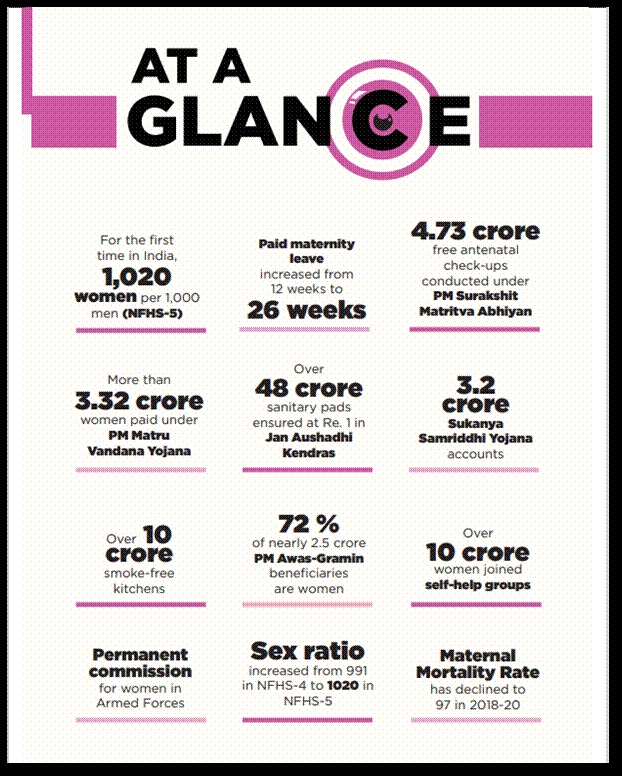
Protecting Women’s Dignity: Swachh Bharat Mission
“Swachh Bharat Mission has benefited the poor and the women most.”
- Prime Minister Narendra Modi
Sanitation is the basic need of human beings. Despite the widely accepted fact about the critical importance of sanitation and personal hygiene, sanitation coverage in India was as low as 39% until 2014. This was severely affecting the health and dignity of people in rural areas, especially women and children.
Realising the problems faced by women and children on account of the lack of toilets, Prime Minister Narendra Modi launched the Swachh Bharat Mission (SBM) on October 02, 2014, to provide toilets to all households in the country over a time period of five years. On August 15, 2014, the Prime Minister called on the people of the country from the ramparts of Red Fort to join the Swachh Bharat Mission and pay their tributes to Mahatma Gandhi on his 150th birth anniversary by dedicating to him a Swachh Bharat.
Under SBM-Gramin, over 12 crore toilets were constructed in the country.
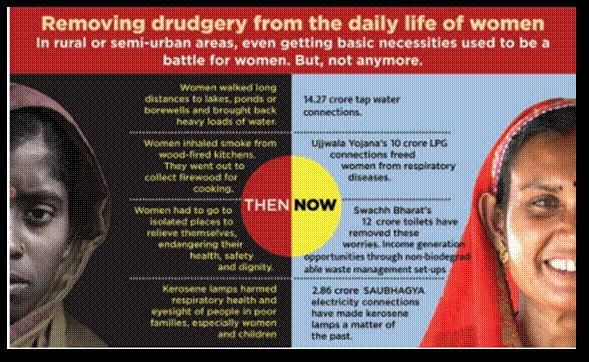
As of 2024, more than 5.2 lakh villages have declared themselves ODF Plus, which is a significant step towards achieving the SBM-G phase II goals by 2024-25.
Before toilets were constructed, women and girls felt a sense of helplessness and fear, sometimes even shame, when taking care of their sanitation needs in the open. They would deliberately limit their intake of water and other liquids to control the urge to urinate. This would result in health-related problems. Further, open defecation placed women and girls in danger, as they often faced harassment and assault from men, or were attacked by animals.
As per the report titled “Access to toilets and the safety, convenience and self-respect of women in rural India”, after the construction of toilets, 93% of women reported that they were no longer afraid of being hurt by someone or harmed by animals while defecating; 93% of women reported they are no longer afraid of contracting health infections; 92% of women said they were no longer afraid of going to the toilet in the dark of night, which is a huge jump from the pre-toilet construction stage (12%); and 93% of the women reported no longer having to stop having food or water to control the urge to defecate or urinate.
It can be said, without any doubt, that women have been the biggest beneficiaries of this programme. SBM has brought about an irreversible improvement in the quality of life of women in the rural and urban areas, by promoting cleanliness, and hygiene, and eliminating open defecation.
Drinking Water at the Doorstep: Jal Jeevan Mission
“The vision of Jal Jeevan Mission is not only to make water accessible to the people. It is also a massive decentralization movement. This is a village-driven and women-driven movement.”
- Prime Minister Narendra Modi
Water is the basis of life. No human activity is possible without water. Drinking water supply is, therefore, an essential and crucial component for the well-being of a community. Launched by Prime Minister Narendra Modi, on August 15, 2019, the core objective of the Jal Jeevan Mission (JJM) is to improve the lives of people, especially women and children, by ensuring clean tap water supply to every rural household and public institutions in villages by 2024.
From Independence till August 2019, out of a total of 19.14 crore rural households, only 3.23 crore (17%) households had tap water connections. Thus, a whopping majority of 83% of rural households were devoid of any functional tap water connection. As of 2024, over 14.30 crore households have been provided with
tap water connections under JJM. Further, 178 districts, 1,803 blocks, 98,660 Gram Panchayats, and 2,05,259 villages have reported to achieve ‘Har Ghar Jal’ status.
In the absence of access to potable drinking water at home, families, especially women and young girls are forced to spend lots of time and energy every day fetching water for their families. Jal Jeevan Mission is making concerted efforts to free women from the age-old drudgery of fetching water from a distance carrying heavy loads and to make the villages – WASH (Water, Sanitation & Hygiene) -enlightened villages.
By involving women in the planning, decision-making, implementation and monitoring of JJM, the mission is playing an important role in women’s empowerment.
Empowering Women Entrepreneurs: Stand-Up India and PM MUDRA Yojana
“Financial independence of women leads to increasing their participation in decision making.”
- Prime Minister Narendra Modi
Women in our country can do anything when provided with opportunities. As India is growing rapidly, hopes, aspirations and expectations of women are also rising significantly. They want to move away from being job-seekers and become job-creators.
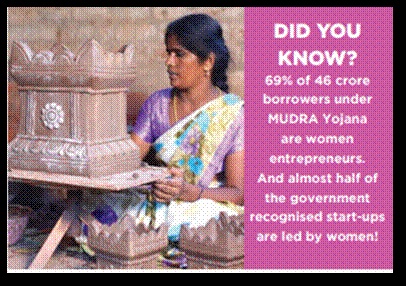 Understanding the potential of these rising women entrepreneurs in driving economic growth and removing any bottlenecks in getting institutional credit, the Government of India has launched two major schemes - Pradhan Mantri MUDRA Yojana (PMMY) and Stand-Up India.
Understanding the potential of these rising women entrepreneurs in driving economic growth and removing any bottlenecks in getting institutional credit, the Government of India has launched two major schemes - Pradhan Mantri MUDRA Yojana (PMMY) and Stand-Up India.
Stand-Up India aims to promote entrepreneurship amongst Women, Scheduled Castes (SC), and Scheduled Tribes (ST) categories and help them in starting a greenfield enterprise.
PMMY was launched to provide loans up to Rs. 10 Lakhs to non-corporate, non-farm small/micro enterprises. As of 2024, 46 crore loans were sanctioned under PMMY. In the year 2022-23 itself, 2.24 crore loans for an amount of Rs. 4.56 lakh crore have been sanctioned under the scheme.
Stand-Up India aims to promote entrepreneurship amongst Women, Scheduled Castes (SC) and Scheduled Tribes (ST) categories and help them in starting a greenfield enterprise. Since the inception of the Stand-Up India scheme, more than Rs 50,000 crores has been sanctioned to over 2.21 lakh accounts (as of 6 March 2024).
The participation of women is increasing continuously in the growth cycle of New India. Both these schemes have promoted the entrepreneurship culture at the grassroots level focusing on economic empowerment and job creation. Women, in particular, have benefitted tremendously from these two schemes. Around 69% of the loans have been sanctioned to women entrepreneurs under PMMY.
Giving Wings to Girl Child: Beti Bachao Beti Padhao
“Let us celebrate the birth of the girl child. We should be equally proud of our daughters. I urge you to sow five plants when your daughter is born to celebrate the occasion.”
- Prime Minister Narendra Modi
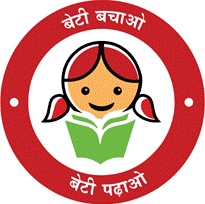 The trend of decline in the Child Sex Ratio (CSR), defined as the number of girls per 1000 boys between 0-6 years of age, has been unabated since 1961. The decline from 945 in 1991 to 927 in 2001 and further to 918 in 2011 has been alarming. The decline in CSR is a major indicator of women’s disempowerment. It reflects both pre-birth discrimination manifested through gender-biased sex selection and post-birth discrimination against girls.
The trend of decline in the Child Sex Ratio (CSR), defined as the number of girls per 1000 boys between 0-6 years of age, has been unabated since 1961. The decline from 945 in 1991 to 927 in 2001 and further to 918 in 2011 has been alarming. The decline in CSR is a major indicator of women’s disempowerment. It reflects both pre-birth discrimination manifested through gender-biased sex selection and post-birth discrimination against girls.
Against this backdrop, Prime Minister Narendra Modi launched the Beti Bachao Beti Padhao (BBBP) scheme on January 22, 2015, to celebrate the Girl Child in an attempt to foster a change in the minds and hearts of the people of our country and to ensure survival, protection, and education of the girl child.
India’s overall child sex ratio rises to 1020 girls per 1000 boys for the first time ever. The Maternal Mortality Rate has declined to 97 in 2018-20. Percentage of Institutional Deliveries has also shown an improvement and over 4.73 crore free antenatal check-ups conducted under PM Surakshit Matritva Abhiyan.
Today, BBBP has captured the national consciousness of valuing the girl child. By valuing the contribution of women to society, the programme is not only trying to address prejudicial treatment meted out to the girl child before birth but also addressing the unjust access to resources and care that she faces even after birth.
Fighting Malnutrition: POSHAN Abhiyaan
“We began the POSHAN Abhiyaan with an unwavering commitment to ensure proper nutrition facilities for our women and children. India will progress when our youth and Nari Shakti are healthy.”
- Prime Minister Narendra Modi
Malnutrition, in all its forms, includes undernutrition (wasting, stunting, underweight), inadequate vitamins or minerals, obesity, and resulting diet-related noncommunicable diseases (WHO). Nearly half of all deaths in children under five years of age are attributable to undernutrition (UNICEF).
The Government of India has accorded high priority to the issue of malnutrition and is taking a holistic approach to address this issue. Launched by the Prime Minister, POSHAN (Prime Minister’s Overarching Scheme for Holistic Nutrition) Abhiyaan aims to address the malaise of malnutrition by improving nutritional outcomes for children under six years of age, pregnant women and lactating mothers in a time-bound manner.
POSHAN Tracker, a robust ICT-enabled platform, has been launched to ensure real-time monitoring of providing supplementary nutrition and real-time information for prompt supervision and management of services.
In order to maximize nutritional outcomes, recently the Anganwadi Services (erstwhile ICDS Scheme), Scheme for Adolescent Girls and PoshanAbhiyaan have been re-aligned under ‘SakshamAnganwadi and POSHAN 2.0’ (Mission Poshan 2.0). It seeks to address the challenges of malnutrition in children, adolescent girls, pregnant women and lactating mothers through a strategic shift in nutrition content and delivery and by the creation of a convergent eco-system to develop and promote practices that nurture health, wellness and immunity.
Poshan 2.0 focuses on Maternal Nutrition, Infant and Young Child Feeding Norms, Treatment of MAM/SAM and Wellness through AYUSH. Technology is being leveraged under the 'Poshan Tracker', a robust ICT-enabled platform to improve governance about monitoring of provisioning of supplementary nutrition for prompt supervision and management of services.
Under Poshan 2.0, the focus is on diet diversity, leveraging traditional systems of knowledge and popularizing the use of millets. Nutrition awareness strategies under Poshan 2.0 aim to develop sustainable health and well-being through regional meal plans to bridge dietary gaps. Further, greater emphasis is being given to the use of millet (coarse grains) for the preparation of Hot Cooked Meals and Take-Home rations (not raw ration) at Anganwadi centres for Pregnant Women, Lactating Mothers and Children below 6 years of age, as millets have high nutrient content to address anaemia and other micro-nutrient deficiencies in women and children. Under the Supplementary Nutrition Programme of Mission Poshan 2.0, only fortified rice is being allocated to States/UTs.
As per the report of National Family Health Surveys (NFHS) conducted by the Ministry of Health and Family Welfare, the nutrition indicators for children under 5 years and women have improved between the two rounds of the survey conducted in the year 2015-16 (NFHS-4) and 2019-21 (NFHS-5). The prevalence of stunting has reduced from 38.4% in NFHS-4 to 35.5% in NFHS-5, wasting from 21.0% to 19.3% and underweight from 35.8% to 32.1%. Further, the prevalence of underweight among women (15-49 years) has reduced from 22.9% in NFHS-4 to 18.7% in NFHS-5.
Further, as per data recorded in Poshan Tracker, ICT application for Mission Poshan 2.0, close to 7 crore children were measured in the country in June 2023 as per which, 7% were wasted and 19% underweight, which is significantly lower than NFHS indicators.
Providing Security to Muslim Women: Abolition of Triple Talaq
“Judgment of the Hon’ble SC on Triple Talaq is historic. It grants equality to Muslim women and is a powerful measure for women’s empowerment”
- Prime Minister Narendra Modi
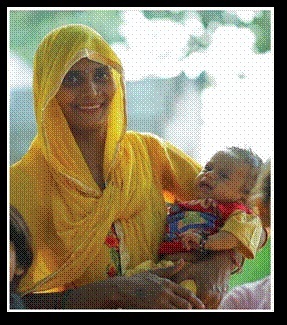 Talaq-e-Biddat or Triple Talaq is a form of divorce that was practised in Islam, whereby a Muslim man could divorce his wife by pronouncing talaq three times. The man need not cite any reason for the divorce and the wife need not be present at the time of pronouncement of talaq. Banning the evil practice of Triple Talaq has been a demand of Muslim women for a very long time.
Talaq-e-Biddat or Triple Talaq is a form of divorce that was practised in Islam, whereby a Muslim man could divorce his wife by pronouncing talaq three times. The man need not cite any reason for the divorce and the wife need not be present at the time of pronouncement of talaq. Banning the evil practice of Triple Talaq has been a demand of Muslim women for a very long time.
The Supreme Court declared instant Triple Talaq to be in violation of Article 14 of the Constitution in a majority decision issued on August 22, 2017. Even after the Supreme Court’s order declared this practice unconstitutional, the practice of Triple Talaq continued.
After being passed by both Houses of Parliament, the Muslim Women (Protection of Rights on Marriage) Act, 2019 came into force. The Act declared instant divorce granted by the pronouncement of talaq three times as void and illegal. It provides for imprisonment for a term of up to three years and a fine to the husband who practised instant Triple Talaq.
Triple Talaq law brought legal protection for Muslim women who were the victims of this regressive practice for the last several decades. This historic reform improved the existing conditions of Muslim women and helped them to come out of domestic violence and discrimination they were facing in society.
Supporting Motherhood: Pradhan Mantri Matru Vandana Yojana
The Pradhan Mantri Matru Vandana Yojana (PMMVY) scheme was launched in the year 2017. Under PMMVY, a cash incentive of ₹5,000/- is provided directly to the beneficiary via Direct Benefit Transfer (DBT) mode for the first child. In the revamped PMMVY, maternity benefit is also to be provided for the second child, but only if, the second child is a girl child, to discourage pre-birth sex selection and to promote and celebrate the girl child. The eligible beneficiaries receive the remaining cash incentive, under Janani Suraksha Yojana after institutional delivery, so that on average a woman gets Rs. 6,000.
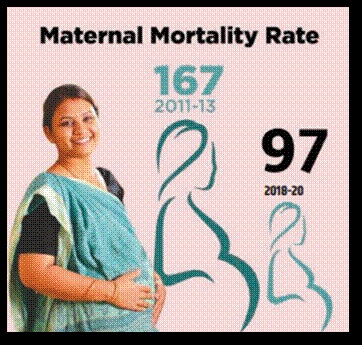 As of 2024, under Pradhan Mantri Matru Vandana Yojana (PMMVY), more than 3.32 crore beneficiaries have been enrolled and maternity benefits of more than Rs. 14,103 crore have been disbursed to over 3.11 crore beneficiaries.
As of 2024, under Pradhan Mantri Matru Vandana Yojana (PMMVY), more than 3.32 crore beneficiaries have been enrolled and maternity benefits of more than Rs. 14,103 crore have been disbursed to over 3.11 crore beneficiaries.
Janani Suraksha Yojana (JSY) was launched to reduce maternal and neonatal mortality by promoting institutional delivery among pregnant women. Owing to the consistent efforts of the Government, India has successfully achieved the milestone of bringing down its MMR to 97/lakh live births in 2018-20, well in time.
Pradhan Mantri Matru Vandana Yojana has played a crucial role in improving the lives of women by providing them with financial assistance during pregnancy and lactation periods. By compensating for the wage loss and expenses incurred during their pregnancy and post-delivery period, this scheme has not only provided economic support to women but has also encouraged them to seek timely medical care, leading to a reduction in maternal and infant mortality rates. Additionally, the scheme has increased awareness and promoted the importance of maternal and child health, thereby empowering women and improving their overall well-being.
Suvidha at ₹ 1: Pradhan Mantri Bhartiya Janaushadhi Pariyojana
The Pradhan Mantri Bhartiya Janaushadhi Pariyojana (PMBJP) aims to provide quality medicines at affordable prices to the masses through dedicated outlets known as Pradhan Mantri Bhartiya Janaushadhi Kendras (PMBJK).
PMBJP has been implemented by the Pharmaceuticals & Medical Devices Bureau of India (PMBI), a society under the aegis of the Department of Pharmaceuticals, wherein over 10000 dedicated outlets known as Pradhan Mantri Bhartiya Janaushadhi Kendras (PMBJKs) have been opened till June 30, 2023, to provide quality generic medicines at affordable prices. Prices of medicines sold through these outlets are 50-90% less than that of branded medicine prices in the open market.
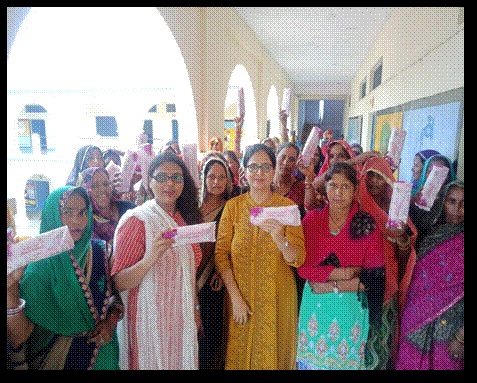
For women, sanitary pads are sold at just ₹1 at more than 9304 PMBJP Kendras covering 745 out of 766 districts across the country. As of 2024, over 48 crore Janaushadhi Suvidha Sanitary pads have been sold at Pradhan Mantri Bhartiya Janaushadhi Kendras.
By providing low-cost and high-quality sanitary pads, Janaushadhi Suvidha is making menstrual products more accessible to women who would otherwise have to resort to unhygienic alternatives. Thus, it is empowering women to manage their menstrual health by offering an affordable solution.
Securing Future of Girl Child: Sukanya Samriddhi Yojana
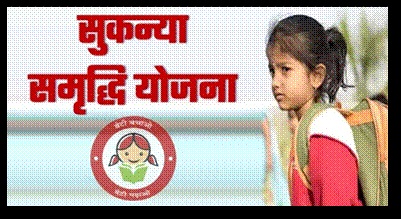 The Sukanya Samriddhi Yojana (SSY) is a small deposit scheme of the Government of India meant exclusively for a girl child. It was launched by Prime Minister Narendra Modi on January 22, 2015, as a part of the Beti Bachao Beti Padhao campaign.
The Sukanya Samriddhi Yojana (SSY) is a small deposit scheme of the Government of India meant exclusively for a girl child. It was launched by Prime Minister Narendra Modi on January 22, 2015, as a part of the Beti Bachao Beti Padhao campaign.
Since the inception of the scheme, around 3.20 crore accounts have been opened under the scheme.
By providing financial security to the girl child, the scheme has empowered women by giving them access to education. SSY has also raised awareness about the importance of educating the girl child and financial planning for her future, which is a significant step towards achieving gender equality in the country. Thus, Sukanya Samriddhi Yojana has played a vital role in improving the lives of women by ensuring their financial independence and creating a secure future for them.
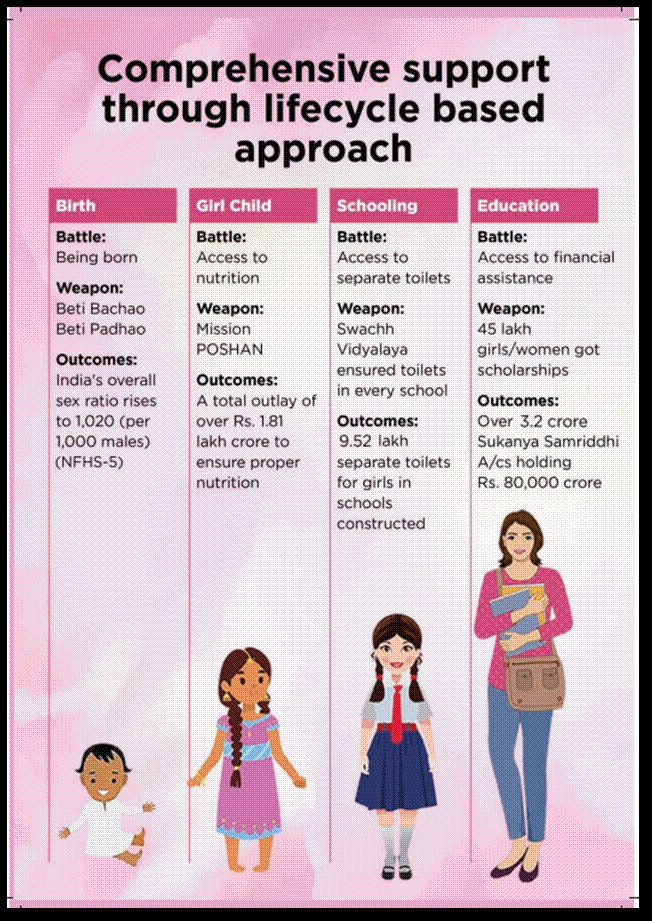
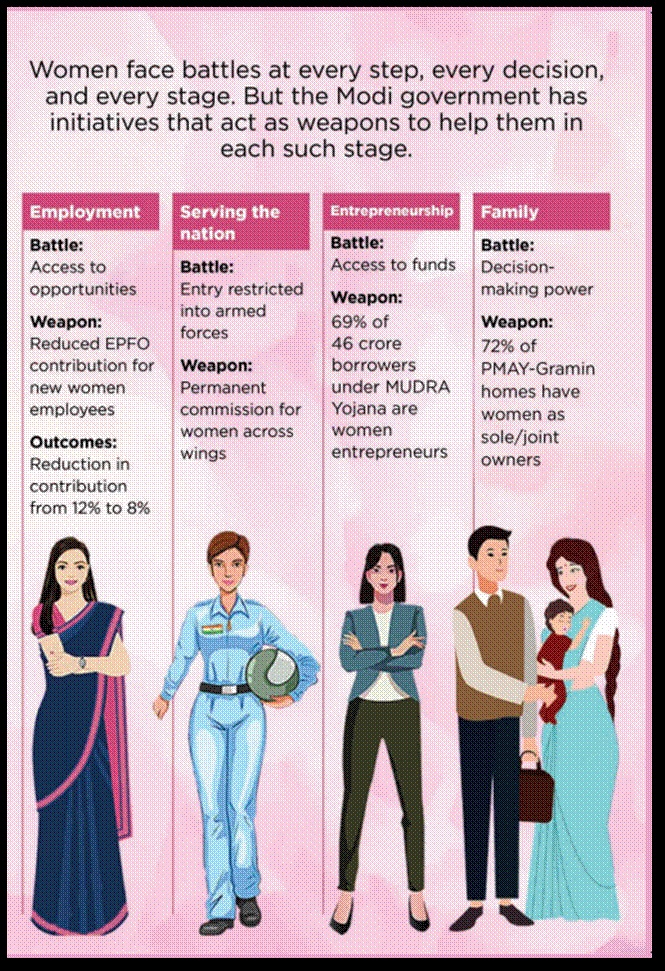
NR/HP/RK/PK/MI
(Backgrounder ID: 151863)
Visitor Counter : 5351